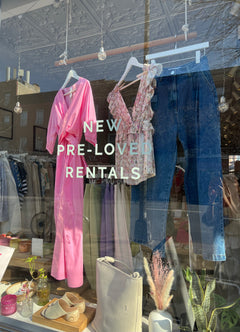Orders & Shipping
We like to keep things easy — here’s how your Rue Saint Paul order makes its way from our Brooklyn shop to your closet.
Order Processing
Orders are packed and shipped within 1–3 business days, Monday through Friday (excluding holidays).
You’ll get an order confirmation email once your order is placed and a tracking email when it’s on its way.
Need to change or cancel your order? Email staff@ruestpaul.com as soon as possible — once shipping begins, we’re unable to make changes.
Shipping & Delivery
-
Standard U.S. Shipping: Flat rate $6.99 via USPS or UPS Ground.
-
Ships from: Brooklyn, NY.
-
Processing Time: 1–3 business days.
-
Signature Required: Orders over $500 will require a signature on delivery.
-
P.O. Boxes: Yes, we ship to them via USPS.
-
Local Pickup: Free and fast — choose Local Pickup at checkout. Most orders are ready within 2–4 hours once processed.
International Shipping
We ship worldwide via DHL, with rates automatically calculated at checkout.
Please note: duties and import taxes aren’t included — international customers are responsible for these fees once their order arrives.
Tracking & Delays
Tracking updates can take 24–48 hours after shipping.
If your tracking hasn’t updated or your package seems stuck, email staff@ruestpaul.com and we’ll help track it down.
Once an order is marked “Delivered” by the carrier, Rue Saint Paul isn’t responsible for lost or stolen packages. If this happens, check with your neighbors or building manager first, then contact the carrier and let us know — we’ll do our best to help.
We can’t control weather, traffic, or carrier delays (we wish we could!), but we’ll always do our best to get your pieces to you quickly and safely.
Rush Shipping
At the moment, we only offer expedited shipping during select holiday periods.
Subscribe to our newsletter for updates when this option is available.
Gifting & Packaging
We currently offer gift boxes for jewelry only.
All orders include a packing slip without prices — perfect for gifting.
Leave a note at checkout if your order is a gift, and we’ll remove all price tags before shipping.
We use recycled, recyclable, and compostable packaging whenever possible. From paper mailers to minimal plastic, we’re committed to reducing waste and keeping things planet-friendly.
Questions?
We’re here to help.
Email us at staff@ruestpaul.com or call 929-283-5950 during shop hours




